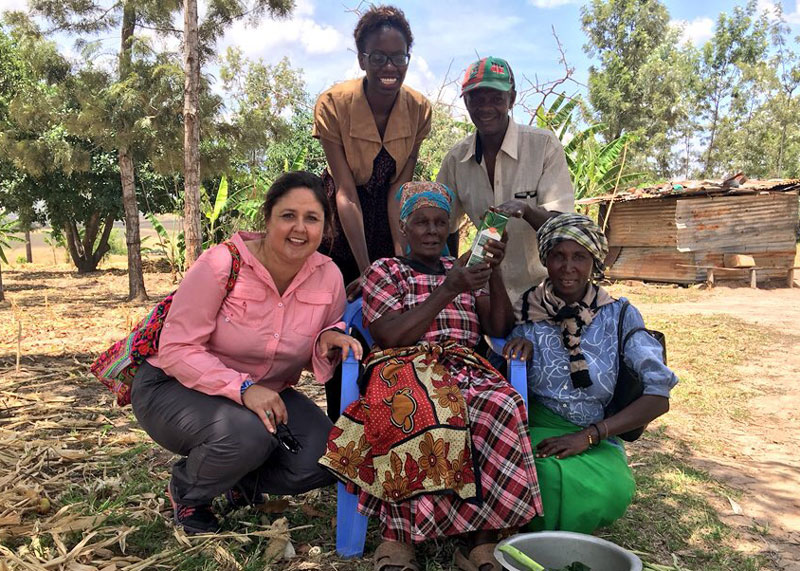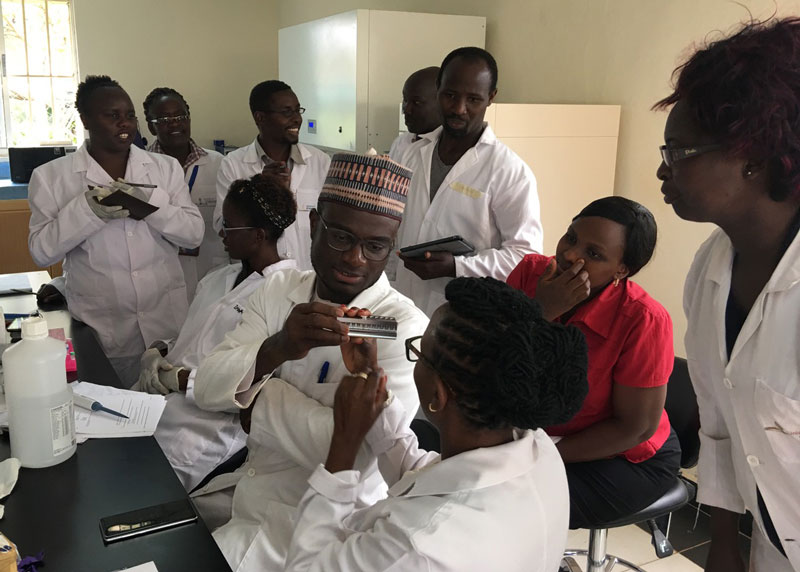

Novel diagnostic methods for identifying vectors and viruses in farmer’s fields
April 28, 2018
With thanks to The Crawford Fund, Dr Laura M. Boykin, Senior Research Fellow at The University of Western Australia, travelled to Eldoret and Nairobi, Kenya to conduct a six-day training program.
Along with Elijah Ateka, Associate Professor in the Department of Horticulture at Jomo Kenyatta University of Agriculture and Technology, Dr Boykin presented training for five farmers and 20 researchers from the Jomo Kenyatta University of Agriculture and Technology (JKUAT) and the University of Eldoret (UE) on new diagnostic methods for identifying vectors and viruses, in particular the Whitefly.
Dr Boykin’s work with Whiteflies in Kenya follows a number of training exercises supported by The Crawford Fund.

The Whitefly is not a fly at all, it is actually a relation of the aphid. These tiny insects thrive in tropical environments and use their needle-like mouthparts to feed on plant sap. Whiteflies are polyphagous, meaning they eat a wide variety of plants (over 600 varieties) and are known to transmit over 100 viruses. These Whitefly transmitted viruses (WTV) compromise many of the fruits and vegetables grown in developing countries and often results in severely reduced crops or complete crop failure. Which has a devastating effect on food, nutrition and biosecurity.
Farmers in Kenya face dire circumstances if their crops suffer from an infestation of Whiteflies. “Without modern diagnostic technology available to many Kenyan farmers, the process of identifying a White Fly infestation takes 6 months to a year. By the time the farming family identifies the infection it is too late to replant, resulting in food insecurity for that year,” says Dr Boykin.
“To mitigate these losses, and predict potential pest and disease outbreaks, robust diagnostic tools are required.”
By making DNA sequencers and training available to communities who wouldn’t normally have access to such technology, significant improvements can be made to crop yields, food security and livelihoods.
The training program run by Dr Boykin and Prof. Ateka aimed to implement new diagnostic methods using the portable DNA sequences to help Kenyan farmers eradicate devastating crop disease through early detection.
“The benefit of early detection means that the farmer can reduce the detection time down from 6 months to just 48 hours,” says Dr Boykin. This timely analysis of crop health enables famers to make informed decisions early enough in the growing season, so they can replant with virus resistant material provide by plant health officials.
The training program involved the planting of a sample cassava crops on farmer’s fields for onsite testing. The farmers and researchers then participated in hands on experiments with DNA extraction of the cassava. A plant DNA library was then prepared of each farmer’s sample crop. The participants then learned how to load the portable DNA sequencers (Nanopore Minion) and analyse the nonopore data.

Bioinformation training was also provided for broader impacts of DNA sequencing. At the conclusion of the training program, the DNA sequencing results of the trial crops were reported back to the farmers. Virus free crop material was also allocated to the participants.
As a result of the training, the teams at UE and JKUAT are now equipped with the skills to carry out portable DNA sequencing on any pest or disease – not just cassava crops. The training also opened up connections between several institutions in Kenya and Western Australia that will assist in future trade.
“The teams from UE and JKUAT learned a lot from the training and we are now in discussion to co-write grants together to begin filling in the equipment and funding gaps to impact the livelihoods of more farmers.”
“We aim to impact 10 million farmers in the next 6 years,” Dr Boykin said of her ongoing research with the University of Western Australia.
“Thank you very much for the support. It is the start of many projects that will positively impact smallholder farmers.”
Upcoming event: 3rd International Whitefly Symposium 2018, 16-21 September 2018, The Esplanade Hotel Fremantle, Perth, Western Australia




 0
0